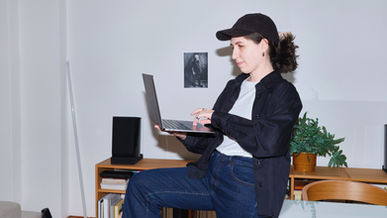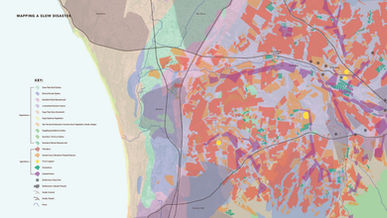Biennale Democrazia: Visible Temporary Parliament
- Carolina Lio
- Mar 20, 2023
- 2 min read
Updated: Jan 23, 2025
We have curated the communication and the booklet for this event in Turin on Sunday, 26 March, in the framework of Biennale Democrazia. The Visible team (Judith Wielander, Matteo Lucchetti and Carolina Lio) curates a new temporary parliament hosted in Sala Rossa, at the Turin City Hall. The parliament/assembly will be dedicated to artistic projects situated on the Italian territory and that practice ideas of freedom declined as decolonisation, resilience and regeneration in peripheral and rural contexts.
The three projects that will be presented and discussed are Casa delle Agriculture in Castiglione d'Otranto, in Salento; Ente di Decolonizzazione Borgo Rizza developed by DAAR - Decolonizing Architecture (Sandi Hilal and Alessandro Petti) in Carlentini, province of Syracuse; and the Robida collective in Topolò, on the border between Friuli and Slovenia. The three collectives will be in dialogue with guests involved in the fields of economics and policy-making: Valentina Avantaggiato (Mayor of Melpignano), Massimo De Angelis (Professor of Political Economy at the University of East London), Bianca Elzenbaumer (co-founder and coordinator of the Alpine Community Economies Lab) and Salvatore La Rosa (Deputy Mayor of Carlentini).
The event is realised in collaboration with the Polo del '900 in Turin, and on the occasion of the 2023 Democracy Biennale dedicated to the theme of freedom. Free admission without reservation.
Casa delle Agriculture (Castiglione d'Otranto, Lecce) is a voluntary organisation active in the defense of agro-biodiversity, inclusive practices and experimenting with new models of "restanza" in marginal territories. It has been operating since 2012 with the objectives of reviving abandoned land, repopulating the countryside, generating a sustainable economy and strengthening community ties. Among the cultural activities organised, the Notte Verde Festival: Agriculture, Utopias and Communities has become an essential appointment for all those who are interested in sustainable agriculture practices, ecological conversion and models of rethinking the countryside.
Ente di Decolonizzazione is a project by the DAAR collective (Sandi Hilal and Alessandro Petti) which appropriates, by desecrating them, the architectures of the Ente di Colonizzazione del Latifondo Siciliano: a series of villages built by the fascist regime in 1940 in order to colonise the countryside considered backward and non-productive and to impress an urban vision very similar to that which was being built in the same years in the colonies in Libya and in the cities of East Africa occupied and colonised by the Italians. Through the Decolonial Assemblies, a direct dialogue is initiated with groups, individuals and associations that critically address the colonial past.
Robida is a collective that works at the intersection of written and spoken words and spatial practices. It is developed in Topolò, a small town of 22 inhabitants on the border between Italy and Slovenia. Over the years, Robida has organized field recordings, landscape and architecture workshops, and symposiums. Since 2015, the collective has edited Robida Magazine, a multilingual cultural magazine, published once a year. In 2021, it opened two community spaces, one physical, Izba, a small coworking and hospitality space, and one immaterial, Radio Robida. In the same year, the collective also began to develop artist residencies, which adapted to Topolò and its specificities.
Download here below the booklet of the event with the complete programme of the day and texts by Luigi Coppola and Massimo De Angelis, Emilio Distretti and Alessandro Petti, and Michael Marder:




















